home > articles > Impossible Faith – Why some people have found it impossible to believe
CHARLES DARWIN’S IMPOSSIBLE FAITH

Some people find faith in God to be impossible. These people have reasons for their impossible faith. Their objections may be intellectual, moral, or emotional. There are three well-known figures who each exemplify each of these objections to faith in God. Charles Darwin, Thomas Hardy and Bob Hawke each respectively held these particular objections to Christianity.
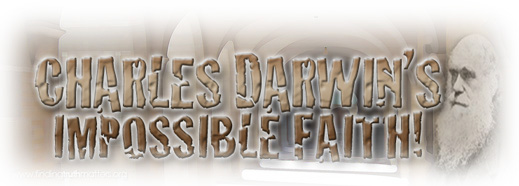 Charles Darwin is considered by many to be one of the greatest scientist of all time.
Charles Darwin is considered by many to be one of the greatest scientist of all time.
“…is widely considered one of the greatest scientists of our age, if not the greatest in the entire history of humankind…”
– Dr. Jerry Bergman
“Who is the greatest biologist of all time? There’s only one answer. Any other invalidates the voter as unqualified. It’s Charles Darwin.”
– Tim Siegfried, editor of Science News
[The ‘Origin of Species’ is considered] “the most important biological book ever written” and “one of the most influential books every written.”
– R.B. Freeman & David Quamman
 Charles Robert Darwin was born 12th February, 1809 in Shrewsbury, Shropshire, England. His mother was the daughter of the wealthy china manufacturer, Josiah Wedgewood while his paternal Grandfather was Erasmus Darwin who published the controversial book, Zoonamia. As a young boy, he showed an unusual interest in beetles and nature generally.
Charles Robert Darwin was born 12th February, 1809 in Shrewsbury, Shropshire, England. His mother was the daughter of the wealthy china manufacturer, Josiah Wedgewood while his paternal Grandfather was Erasmus Darwin who published the controversial book, Zoonamia. As a young boy, he showed an unusual interest in beetles and nature generally.
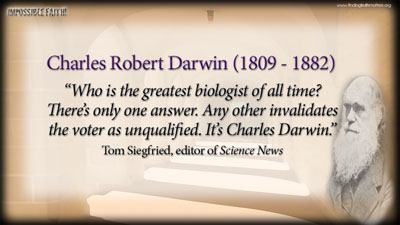 Charles Darwin enrolled in Edinburgh University to study medicine. But Darwin soon found that he was not suited to a career in Medicine and dropped out (largely die to his inability to cope with the sight of blood). His father, not wanting his son to be a loafer enrolled him in Cambridge University with a view to becoming an ordained Anglican Priest. The lifestyle of a rural Anglican Priest in those days would have lent itself to Darwin being able to pursue his interests in nature. His father enrolled him in Christ’s College, Cambridge, in 1827, to do a Bachelor of Arts Degree.
Charles Darwin enrolled in Edinburgh University to study medicine. But Darwin soon found that he was not suited to a career in Medicine and dropped out (largely die to his inability to cope with the sight of blood). His father, not wanting his son to be a loafer enrolled him in Cambridge University with a view to becoming an ordained Anglican Priest. The lifestyle of a rural Anglican Priest in those days would have lent itself to Darwin being able to pursue his interests in nature. His father enrolled him in Christ’s College, Cambridge, in 1827, to do a Bachelor of Arts Degree.
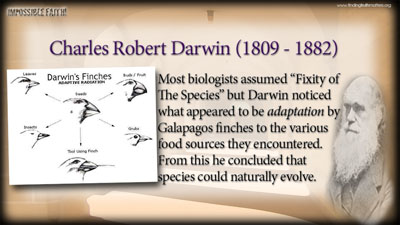 While at Cambridge, Charles spent a lot of time collecting and cataloguing beetles instead of attending lectures. His interest in beetles far exceeded his interest in theology. After Charles completed his M.A. in preparation to take Anglican Orders, his inability to the Vows left him in a quandary. He was then given an opportunity to sail on the HMS Beagle.
While at Cambridge, Charles spent a lot of time collecting and cataloguing beetles instead of attending lectures. His interest in beetles far exceeded his interest in theology. After Charles completed his M.A. in preparation to take Anglican Orders, his inability to the Vows left him in a quandary. He was then given an opportunity to sail on the HMS Beagle.
Most biologists at the time that Darwin was forming his theories assumed “Fixity of the Species”, but Darwin noticed what appeared to be adaptation by Galápagos finches to the various food sources they encountered. From this he concluded that species could naturally evolve. Darwin began to develop his Uncle Erasmus’s “Zoonamia” ideas of ‘trans-mutation of all species’ into what he referred to as The Tree of Life, based on his ideas of survival of the fittest. Darwin assumed that the earlier assumptions of Lamarck were correct, that acquired physical traits could be genetically passed on.
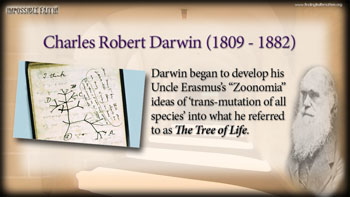 Darwin published his ideas in ON THE ORIGIN OF THE SPECIES, 24th November 1859, in which he asserted his theory that all life originated from a common, simple, first life form.
Darwin published his ideas in ON THE ORIGIN OF THE SPECIES, 24th November 1859, in which he asserted his theory that all life originated from a common, simple, first life form.
“Therefore I should infer from analogy that probably all the organic beings which have ever lived on this earth have descended from one primordial form, into which life was first breathed.“
On The Origin of the Species, pg. 272
WHAT CHARLES DARWIN ASSERTED
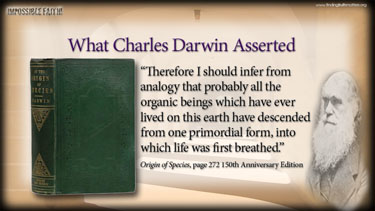 Charles Darwin wrote, “And as natural selection works solely by and for the good each being, all corporeal and mental endowments will tend to progress towards perfection.” (Origin of The Species, pg 275) Darwin was essentially asserting that all life originated from a single life form which he referred to as a “simple life form”. He asserted that life has transmutated from simple toward complex. The mechanism for this transmutation was random but the result was the survival of the fittest. Darwin felt that he could demonstrate this by his observations of the Galápagos finches and their changing beaks. But there were certain things that Charles Darwin didn’t know…
Charles Darwin wrote, “And as natural selection works solely by and for the good each being, all corporeal and mental endowments will tend to progress towards perfection.” (Origin of The Species, pg 275) Darwin was essentially asserting that all life originated from a single life form which he referred to as a “simple life form”. He asserted that life has transmutated from simple toward complex. The mechanism for this transmutation was random but the result was the survival of the fittest. Darwin felt that he could demonstrate this by his observations of the Galápagos finches and their changing beaks. But there were certain things that Charles Darwin didn’t know…
1. The Galápagos Finch beaks were not permanently altered.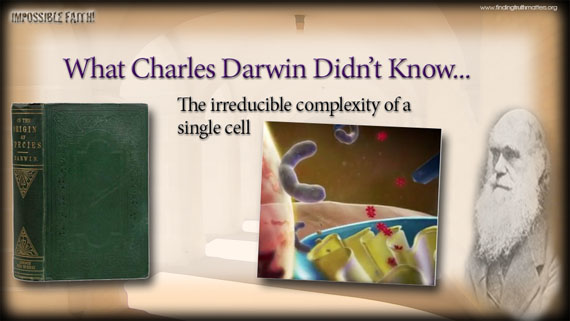
In fact, in Dr Jonathan Wells book, The Icons of Evolution, he shows that the Galápagos finch beaks return to their original size when the environmental conditions are conducive. Dr Wells notes that the beaks of these finches undergo change in shape and size dependent on the various climatic conditions.
2. Physically Acquired Traits Are NOT Genetically Passed On
Darwin did not know about DNA and Genetic information. He had a rather Lamarckian view of transmutation of the species. That is, he seems to have believed that a giraffe got its long neck because it had to reach up beyond its neck’s usual capacity to the leaves on the tree and was able to physically adapt to be able to do this and then pass that acquired physical trait onto its descendants. But what Charles Darwin didn’t know was that physical inheritance was the result of genetics (DNA). DNA is the information which controls how life itself is assembled. It is a very complex language. It is also necessary before there are any physical components to assemble. That is, life could not have assembled then written its DNA.
3. That The Simplest Life Form Is Irreducibly Complex
Charles Darwin assumed that biological life was simple. Unaware of the intricacies of micro-microscopic genetic components, despite the cell theory, being first developed in 1839 by Matthias Jakob Schleiden and Theodor Schwann. They argued that all organisms are composed of one or more cells, that all cells come from preexisting cells, that vital functions of an organism occur within cells, and that all cells contain the hereditary information necessary for regulating cell functions and for transmitting information to the next generation of cells [Source]. Darwin appears to have been unaware of this.
Obviously, and it might sound trivial, the organization of living matter in space and time (the development of an organism) are the important biological data to study. Considering all the variability in form and function encountered in nature, one might as a designer ask, how little it would take to build a viable organism. In other words:
What is the minimal genetic information needed to specify the essential components for a cell to be alive?
The first microorganism who’s complete genome has been sequenced, the bacteria Haemophilus influenzae Rd., contains 1,743 genes [Fleischmann et al., 1995]. Haemophilus influenzae is a small, non-motile Gram-negative bacteria. It causes ear infections and meningitis. The following information could provide researchers with a guidebook to the minimum number of cellular components necessary and sufficient to sustain life:
– 1,830,137 base pairs
– 1743 genes, or open reading frames, of which
– 736 open reading frames have not been assigned to any known function
– G+C content 38%, similar to that of human [Source]
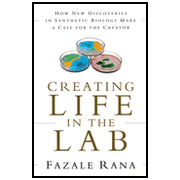 In Dr Fazale Rana’s excellent book, CREATING LIFE IN THE LAB, he shows how it possible for a parasitic cell to consist of around 320 genetic components. His book explores the two main approaches that Biologists are now researching: The Top-Down Approach and The Bottom-Up Approach. In both approaches it appears that the minimum number of genetic materials needed for life is around 300 in correct sequential order. This phenomenal complexity appears to be irreducible. It also makes the idea that Darwin subscribed to, abiogenesis (no cause for the start of life), to be highly improbable (to the degree that it is virtually indistinguishable from impossible).
In Dr Fazale Rana’s excellent book, CREATING LIFE IN THE LAB, he shows how it possible for a parasitic cell to consist of around 320 genetic components. His book explores the two main approaches that Biologists are now researching: The Top-Down Approach and The Bottom-Up Approach. In both approaches it appears that the minimum number of genetic materials needed for life is around 300 in correct sequential order. This phenomenal complexity appears to be irreducible. It also makes the idea that Darwin subscribed to, abiogenesis (no cause for the start of life), to be highly improbable (to the degree that it is virtually indistinguishable from impossible).

In the closing chapter of ON THE ORIGINS OF THE SPECIES, Charles Darwin concedes that there must be a “Creator” in order to explain how everything must have originally come into existence. Yet privately Darwin rejected this notion. He felt that his theories could now make a way to do without God. For Charles Darwin, he found faith in the God of the Bible “impossible” for intellectual reasons. We can only wonder how different his beliefs may have been if he had been aware that the fossil record would later reveal the sudden appearance of life (the “Avalon” and “Cambrian” “Explosions”) and that the study of Genetics would reveal amazingly complex and intelligent language necessary for even the “simplest” life to exist.
Perhaps Darwin was familiar with the Bible text that declared that the Logos (Jesus Christ, the sum of all Reason) was made flesh (became “human”) and that this same Logos was the Source of all Creation-

And in what we might regard as quite applicable to Charles Darwin, the same passage of the Bible sombrely declares-
“He was in the world, and the world was made through him, yet the world did not know him.”
John 1:10
There is no reasonable intellectual objection to Christianity that can not be satisfactorily intellectually resolved. Ultimately though, it is rarely on intellectual grounds alone that a person will find faith in Christ “impossible”.
Dr. Andrew Corbett
writing from Legana, Tasmania, 18th October 2011
© Dr Andrew Corbett, 2011, www.findingtruthmatters.org
-
Sale!

Understand The Book Of Revelation, Part 1 (Radio Edition)
Original price was: $1.25.$0.00Current price is: $0.00. -
Sale!

Understand The Book of Revelation, Part 2, Premium Audio Download
Original price was: $1.75.$1.25Current price is: $1.25. -
Sale!

Understand The Book of Revelation, Part 6, Premium Audio Download
Original price was: $1.75.$1.25Current price is: $1.25. -
Sale!

Understand The Book of Revelation, Part 7, Premium Audio Download
Original price was: $1.75.$1.25Current price is: $1.25. -
Sale!
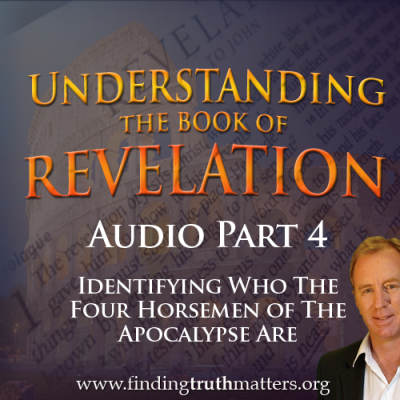
Understand The Book of Revelation, Part 4, Premium Audio Download
Original price was: $1.75.$1.25Current price is: $1.25. -
Sale!

Understand The Book of Revelation, Part 3, Premium Audio Download
Original price was: $1.75.$1.25Current price is: $1.25.









































0 Comments